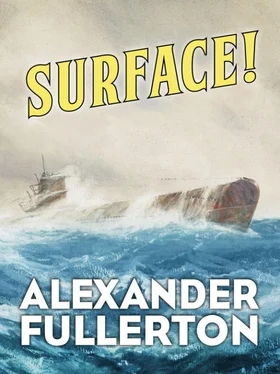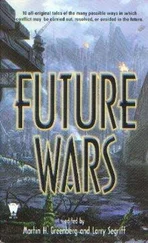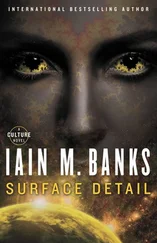The hunt went on, and pattern after pattern exploded savagely round the submarine, which twisted and turned like an eel, twisted and turned in three dimensions as she altered depth sometimes deliberately and sometimes because the charges sent her temporarily out of control. In the for’ard Mess they had grown used to it, powerless to do anything but hang on and wait as the explosions came at more or less regular intervals and they felt the lift and tilt of the deck under their feet. The deck was carpeted in the cream-coloured chips of cork and paint. Shadwell stared at it gloomily.
“We’ll ’ave this flippin’ lot to clean up, I suppose, soon as them bastards get sick of droppin’ muck on us.” As he spoke a pattern exploded, a harsh, ringing crash. Sub, his eyes on the deckhead, could almost imagine that he saw the plates bulging inwards under the impact.
Chief Petty Officer Rawlinson’s hands, hidden in the pockets of his shorts, were clenched into fists. An experienced submariner, the survivor of dozens of such attacks, he knew that Seahound would not stand much more of this hammering. If the enemy held the contact, it would only be a matter of time. Ten minutes? … Half an hour? Nobody could tell when the last pattern would do its work. He looked up, and met the Sublieutenant’s eyes: through the mask that each of them had assumed, each could see that the other was under no delusions as to how things were going. Shadwell knew, too: he sat on the deck with his arms round his knees, singing softly, under his breath, a song about a lady of easy virtue.
Five minutes had passed since the last charges. Sub studied his watch, not letting himself give way to any premature hopes of escape. The T.I., seeing his action, pursed his lips and strained his ears for the sound of returning propellors. But all seemed quiet, still.
Ten minutes had passed. They looked at each other, and now in Rawlinson’s seasoned face was the dawn of relief. Five minutes later, when for a quarter of an hour the submarine had seemed to be steady and keeping an even depth while no explosions shattered the tense underwater silence, Sub looked round and grinned.
“Looks as though they’ve lost us, T.I.”
“Shouldn’t be surprised, sir.” Rawlinson was cleaning his nails with a small screwdriver.
* * *
As soon as Seahound surfaced that evening, the Petty Officer Telegraphist was busy tapping out a signal which Chief and Number One had spent the afternoon putting into cipher. When they had done it they gave it to the Captain to decipher, as a check, and they felt quite pleased with themselves when it came out into the original message again. The message announced the sinking with torpedoes of a Japanese cruiser of the Yashima class, the time and position of the sinking, and the fact that the escort of two destroyers were believed to have left the vicinity of the Andamans at 1300 hours on a course approximately North-East by East. It added that Seahound had suffered no damage.
The telegraphist was still tapping when the Captain joined the others in the wardroom. There wasn’t much to say: the success was too big, too obvious, for comment. The Captain addressed the First Lieutenant:
“Number One – were there any breakages?”
“One or two, sir. Nothing very serious.”
“The Cox’n’s Store – was a rum-jar broken, by any chance?”
Number One smiled an odd smile. “There could easily have been, sir.” The Captain pressed the buzzer for a messenger.
“Tell the Cox’n I want to see him.”
Chief Petty Officer Smith heaved happily into sight. “See me, sir?”
“Cox’n – I believe a jar of rum was smashed during the fun and games this morning.”
“No, sir – I mean, yes, I believe one was, sir.”
“Very good, Cox’n. I’ll write it off. And now – splice the mainbrace.”
“Aye aye, sir.” It meant a double issue of rum for all hands, including officers, rum that on paper did not exist, since the jar had been smashed during the depth-charging and its contents were now, officially, mingled with a certain amount of dirty water in the bilges.
These things had to be seen to in an official manner.
Supper was cleared away when the dots and dashes became audible from the wireless office, where the telegraphist on watch was receiving a signal. Chief was in such an unusual frame of mind that he started quite happily to gather his books together, and set to work humming to himself.
It was a signal acknowledging their last one, a signal of very hearty congratulations. The Captain read it out to the Ship’s Company, over the broadcasting system. It had not been unexpected.
* * *
They realised afterwards how it was that they’d been lucky enough to get away with it. The Japanese squadron had sailed in a hurry, on last-minute orders. The two destroyers had only a few depth-charges on board, and they only had time before they sailed to get another truck-load each. This was discovered a week later, after the destroyers had been sunk by British destroyers and some prisoners were interrogated.
All the same, the score-board in the wireless office, where the Telegraphists sat during the depth-charging and made a cross for each explosion, showed a hundred and nineteen crosses.
* * *
Sub was dreaming about Sheila, Sheila and he in a canoe, and just at the moment, the embarrassing moment, that he was about to kiss her and she turned into Major Worth, he found himself awake on his bunk with a smell of fried breakfast and coffee in the air. Chief, who had shaken him out of his dream, was sitting there grinning at him.
“Look,” asked the Sub. “What’s going on?”
The Captain said: “Many Happy Returns, Sub.” Chief said the same thing. Number One shook his hand and said, “Congratulations, Sub.”
He’d forgotten all about it. It was his 21st birthday. Twenty-one: he’d been fighting in the war at sea for four years.
Chief handed him something wrapped up in a lot of brown paper and string. Sub took a dirty knife from somebody’s used plate, and cut the string: he unwrapped the paper and found a huge key.
“Key of the door,” explained Chief. “Featherstone filed it up last night.”
During his off-watch period, the E.R.A. had filed this outsize key from a lump of metal.
“Chef was busy too, last night.” Number One spoke. “Made you a birthday cake. He says he’s never baked a cake before, and he’s worried about how it’ll turn out.”
These were the gifts that counted; they were the emblems of friendship and affection of men who gave neither lightly.
“How does it feel to be twenty-one, Sub?”
“All I feel at the moment is hungry. Wilkins!” – They all started, and as he shouted the name the memory hit him in the pit of his stomach and his head swam with the way it hurt, and the fool he felt was plain in his face.
“I’m sorry. I’m damned sorry.” He thought: well, twenty-one isn’t old enough, it seems. I’ll have to be forty before I stop making frightful, unforgivable mistakes like that. With the one shout he had wrenched savagely at the new scar on a fresh, painful wound, and he had seen the quick, shocked pain in three faces. Now, in his mind, he saw the way Wilkins drooped and slumped as his lungs came out through his sides and the blood, the ribs, and his grey broken face. Dear God, forgive…
“Sub.”
“Sir.”
“Your breakfast is getting cold. And don’t be a damn fool. Any of us could have done that.”
Yes, any of them could have, the habit of over a year of breakfasts combining with the sleepy brain. Any of them. The trouble was, it had been he. He thought to himself: it always is.
Читать дальше












